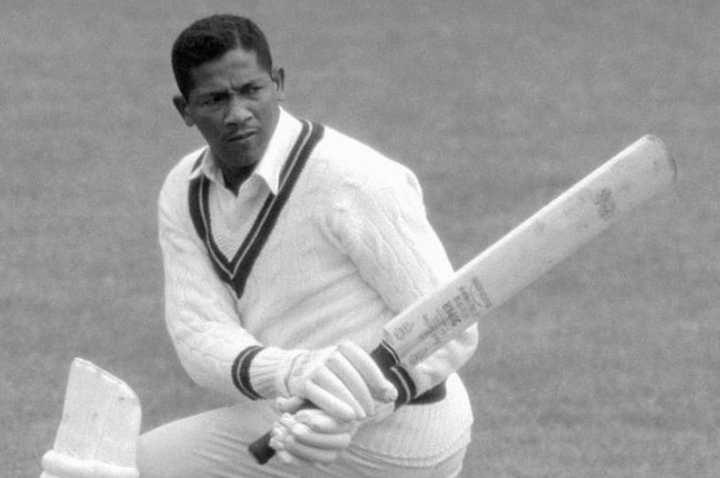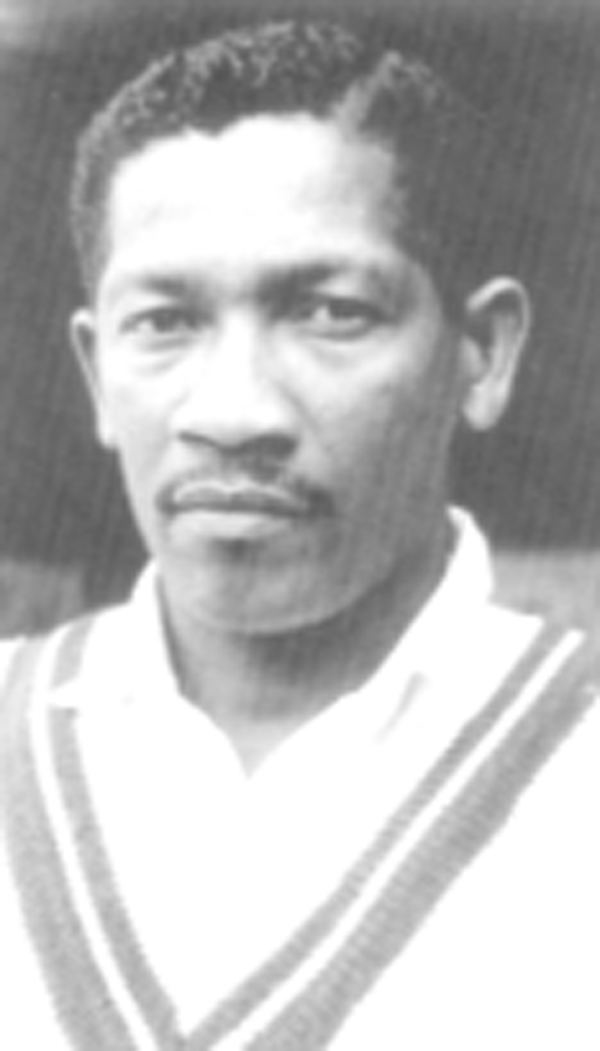Basil Butcher, the Guyanese and West Indian cricketer, died at the age of eighty-six on the 16th December, 2019. His career as a cricketer was recapitulated in the tributes to him. Born in Berbice, his father was a Barbadian and his mother of mixed ancestry. His wife Pam, like his mother, was also an important factor in his life as were his sons. His career commenced in 1958 on the tour to India and Pakistan and ended in 1969 with a test average of over forty (40:00), the gold standard for any test batsman. Butcher was voted Cricketer of the Year in 1970. Yet these facts of his cricket career should not be allowed to obscure his membership of the teaching profession and his knowledge of business. Maybe, it is the teaching profession which endowed him with the capacity to write and speak well. I am still in possession of the programme he drew up in the nineties for the reform of cricket in Guyana. It is well written and persuasively argued.
Butcher’s roots in Port Mourant had a deep and abiding influence on his life. He spoke often of it. His mother who managed a bakery was his guiding light. I heard of his childhood and the early association with Joe Solomon and Rohan Kanhai. Solomon was regarded as a kind of an “aristocrat” as his father was a butler at the Estate. I have heard Butcher express opinions of many persons but he always spoke of Rohan Kanhai almost with reverence, which reflected the abiding respect he had for the man. There was one other cricketer who was close to Butcher and that was Ivan Madray, who played two test matches against Pakistan 1958. During a test match at Bourda Butcher introduced me to him. As I shook his hand I discovered it was the largest hand I had ever seen. Madray was a leg spinner.

Port Mourant was a nursery and a laboratory for cricket in Berbice. And Butcher studied its elements with great care. He often remarked on the fact that rising cricketers in Berbice recognised the influence and example of John Trim who had toured India with the West Indies in 1948. Butcher was not the most sentimental of men but he spoke wistfully on occasions about the decline of Trim. He told me the story of Trim being denied a chance to make a living from cricket. A letter was sent to him from a league club in England offering him a contract. It remained on the desk of some official of the then Cricket Board. Trim never saw it. I raised with Butcher several of the stories of Clyde Walcott’s “discovery” of Kanhai, Solomon and himself. Interestingly enough while he admitted that Walcott played some part in their development as cricketers, Robert Christiani was also an important influence.
There were also deep reflections on the players of his time in Berbice who were brilliant but never made it to the top. Often Butcher referred to Johnny Teekahsingh who could spin leg breaks with a new ball. Joe Solomon, as a fielder, was etched in his memory. Solomon was well known for throwing down the wicket from almost any position in the field. In the words of Basil Butcher: “If those Australians had asked the Berbicians about Solomon, they would have never hit the ball to him and run.” There is a cricketer from Berbice who had rescued Guyana along with Charlie Stayers against Barbados in the late fifties and who held an endless fascination for me. His name was Sonny Moonsammy. Often, when cricket became a matter of fierce contention with the grey heads and the grey beards, an opinion would escape them that Sonny was as good as or better than Rohan. I asked Basil about this. I saw a brow lifted and heard a conclusive statement: “Sonny was not as good as Rohan.” It had a ring of authority. I declined to continue the conversation under Butcher’s withering gaze. He did concede that Sonny was a brilliant fielder. But he did not go on to say that even in that department he matched his hero.
The facts about Basil Butcher’s career obscure the difficulties he encountered as it got going. The first of these occurred when he was left out of the tour to Australia in 1960/1961. He admitted that his omission almost engineered the destruction of his career. He toyed with the idea of going into business and giving up cricket. Mercifully, he got a contract to play league cricket in England and this brought about his healing and positioned him to be included in the 1963 team to England. What really upset Butcher was the occasion when he was batting with Worrell (he was in a long partnership with Sobers and was closing in on a double century) against the MCC in Barbados in 1960 and a message arrived from Gerry Alexander urging him to score faster. He relayed this message to Worrell who dismissed the interference by saying: “You noticed Basil, he asked you to hurry up, not me,” a remark which reflected the simmering rivalry between Worrell and Alexander over the captaincy of the West Indies cricket team. In going for quick runs Butcher lost his wicket and perhaps his place in the West Indies squad to Australia. The unkindest cut came when Butcher questioned Frank Worrell in England in 1963 about his non-selection for the Australian tour. The great West Indian captain replied: “I did not know enough about you.”
There was a controversy during the tour of India and Pakistan which Basil Butcher witnessed but is rarely mentioned. The confrontation between the Cambridge educated Alexander and Roy Gilchrist, who came from the slums of Jamaica, is part of the history of West Indies cricket. Butcher kept a close watch on the situation; in fact, he wrote a description of the running battles between the two men in an exercise book. He believed that Alexander did not know how to handle Gilchrist and the latter’s behaviour did not warrant his being sent packing from the tour. I sensed that Butcher believed that if Alexander had sought the advice of the other members of the team, Alexander would have made a more rational and humane decision about Gilchrist.
There are two innings played by Basil Butcher which will live forever in the memories of those who, like me, have derived both pleasure and instruction from this most wonderful of games. I was sitting on the edge of the chair in my mother living room in 1963 when Butcher came to the crease with the West Indies in deep trouble. And most West Indian fans were biting their nails. The English bowlers had drawn such a tight defensive net around the West Indian batsmen that at one point Butcher and Kanhai took twenty minutes to move the score from 55 to 56. But gradually Butcher came into his own and scored his best test century. I read somewhere that this innings showed grit and determination. The circumstances warranted it. But there were moments when Butcher freed himself and played glorious on-drives or skipped out to Dave Allen to hoist him over the ropes. It took great strength of character and commitment to allow Butcher to accomplish this great achievement. For moments before he went out to bat he received a telegram informing him that his wife had had a miscarriage.
For me the greatest innings Butcher ever played was at Bourda in 1965 against Australia. He was at the summit of his powers and it showed. Here is the description of that innings by Richie Benaud in his book “The New Champions”:
“It was the sort of innings one could talk about for hours, and in the years to come I probably will, but one stroke will live in my memory for ever. Mc Kenzie had just dropped one short at him and had been smashed through mid-wicket, then had overpitched and been clipped behind square leg for another boundary. The next ball was perfectly pitched to force a defensive stroke-short of a length and on the off stump, a quelling ball for anyone but a master batsman. Quick as a flash Butcher rose on his toes and crashed it past the stumps at the bowler’s end, just as McKenzie was completing his follow through. As the ball smashed against the straight hit boundary everyone on the ground rose to him – spectators, Australian players and, I suspect, even those most diffident of men, the two umpires.”
I found out on a first hand basis of Butcher’s connection with his Barbadian relatives one day when we visited his Aunt in Campbellville. I had known that Roland Butcher who was born in Barbados but ended up playing for England was a relative. What I did not know was that those Bajan roots ran deep. While I was at his Aunt’s house one evening I descended the stairs to go to the toilet and crashed into a tall man who apologised for bumping into me with an unmistakable Bajan accent. I could not wait to rush back upstairs to find out who he was. When I got there I stared at the man in disbelief. I had seen him on the television singing a calypso which was very popular in Guyana called “Big Belly Man.” I quickly discovered that it was indeed Mac Fingall. My attempt to find out what he was doing in Guyana was quickly cut off by the assertion: “I came to see my Aunt.” Just in case you missed it, Basil’s Aunt, Mrs Chester, was also Mac Fingall’s Aunt.
The later period of Basil Butcher’s saw him trying to rescue Guyanese and West Indies cricket from the doldrums. In the case of the latter, he sought to place his considerable expertise acquired while he was a selector and a member of the West Indies cricket Board but did not succeed in doing so. He decided therefore to run for the Presidency of the Guyana Cricket Board and discovered that knowledge and acumen are dangerous things in our society. The manner in which his candidacy was stymied and then rejected is an object lesson of the embedded obscurantism in the culture of our society. Yet towards the end of his life Butcher remained optimistic that cricket in Guyana and the region can be reformed and that we all can recover and recapture the will and commitment which took us the peak of international cricket.
Now my friend has gone ‘to the undiscovered country from whose bourn no traveller returns.” Sleep well, sweet Prince.










